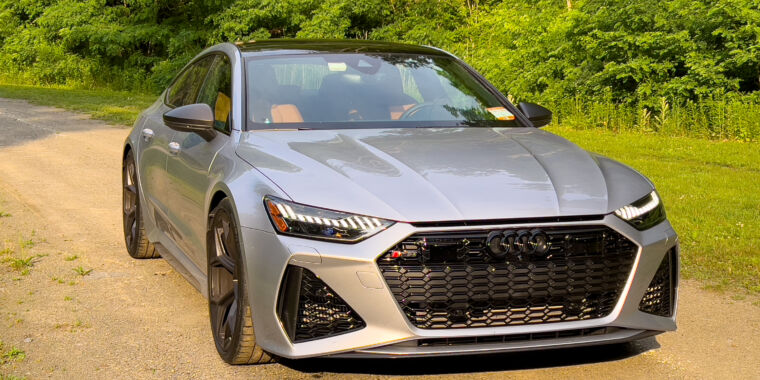Jonathan Gitlin
The arrival of competent electric vehicles is a boon for car enthusiasts as much as those who consider driving a chore and their vehicle a driving appliance. Electric motors can respond faster than the revviest naturally aspirated engines this side of a mid-2000s Formula 1 engine, and with more immediate torque than the mightiest of turbochargers. They are the way forward, for performance as well as energy efficiency. Such is apparent after spending some time behind the wheel of a $128,000 Audi RS7 Performance after a diet of mostly EV performance cars.
For a long time, the RS7 was the Audi to go for if you wanted something with more than two doors, because the R8 doesn’t work with your lifestyle. Based on the more humble A7 fastback sedan, it was worked over by Audi Sport, the four rings’ racing offshoot based up the road from Ingolstadt in Neckarsulm, Germany. The designers there gave it a restyle, with aggressively flared arches to envelope larger wheels and tires, and new aerodynamic features to keep the car planted at speed. The result is one of the brand’s handsomest creations, at least to this observer.
Under the hood, a twin-turbo 4.0L V8 is now even more potent than when we first drove the RS7 in 2019, with 621 hp (463 kW) and 627 lb-ft (850 Nm) at your right foot’s beck and call, sent to all four wheels via an eight-speed ZF 8 HP transmission and, at the rear axle, a torque-vectoring rear differential.
Audi
For model-year 2024 (and 2025, for the car is unchanged), Audi Sport took out 17 lbs (8 kg) of sound deadening, which, in addition to making the car lighter, also fixes one of my chief complaints from that 2019 drive, it being too quiet inside the car when I was in sport mode and wanted to hear the exhaust in its full glory.
This RS7 Performance sounds divine, in fact, with plenty of bass and, in its fruitiest mode, some pops and bangs on the overrun that elicit the odd giggle from the driver. For more mundane occasions with the sport exhaust’s valves closed, it’s unremarkably quiet and won’t wake the neighbors if you leave the house early in the morning (or come home late). A sonorous powertrain is still really the preserve of the internal combustion engine, although some EVs are beginning to play with that idea.
You might be expecting me to extoll the relative lack of mass of this car versus an electric alternative, too, but the RS7 is not exactly a featherweight. Audi Sport took out that sound material, and each of the new 22-inch wheels are 11 lbs (5 kg) lighter than before, but the RS7 Performance still weighs a hefty 4,916 lbs (2,230 kg). So while the all-electric Audi RS e-tron GT is quicker to accelerate—0.4 seconds faster to 60 mph than the 3.3 seconds it takes the RS7—the EV is only really heavier to the tune of a large adult.
Thanks to computer-controlled air suspension, you never really feel like you’re driving a car that weighs more than 2 tons. There’s little roll while cornering, and the power assistance for the steering makes easy work of turning the 285/30-section front tires.
-
Jonathan Gitlin -
A lap of the original Watkins Glen road course was an opportunity to reflect on how dangerous racing there must have been.
Jonathan Gitlin -
It’s a handsome bum.
Jonathan Gitlin -
There’s almost 50 cubic feet (1,382 L) of cargo volume with the rear seats down—more than enough to swallow a bunch of camping gear.
Jonathan Gitlin
The regular A7 already made a good highway cruiser, and the RS7 lost little of those chops even after its Audi Sport enhancement. The seats are comfortable on long drives while still gripping you well when things turn twisty, and they’re heated and cooled, but were I speccing a car at the Audi configurator I’d tick the box for the ones that use their inflatable air bladders to massage you as well.
The interior is well put together, with good sightlines from the driver’s seat. There’s a little too much glossy piano black for my tastes, and points have to be dinged for an over-reliance on touchscreens—bring back discrete buttons or dials for the climate controls, please. The haptic touchscreen needs a gentle press—I was poking it too hard for it to register my intentions, so the system ignored me at times. And the infotainment system is starting to feel a little bit dated in terms of voice recognition compared to Audi’s newest examples.
One downside to those huge tires is a propensity toward tram-lining, which was more noticeable while driving through a weather front. But otherwise the car felt as planted in the rain as it did in the dry. I was even able to better its official EPA rating on the highway by about 10 percent, though that’s still a rather unacceptable 24 mpg (9.8 L/100 km).
Even with the engine, chassis, and transmission settings all at their sharpest, the RS7 never feels less than utterly planted on dry roads. The interruptions in acceleration as the transmission changes up through its gear ratios feel almost jarring after becoming inured to single-speed EVs, but you’ll welcome their presence—and the engine braking they allow—as you slow for a corner.

